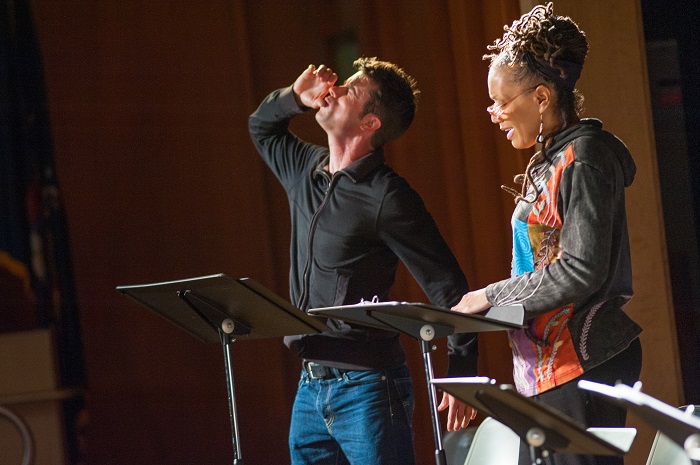Dan Hoyle is a playwright and performer best known for his solo work. In 2014, however, the Working Theater commissioned him to write a multi-character play as part of its Five Boroughs One City initiative, for which five writer-director teams are creating research-based theater pieces in each New York City borough. Hoyle is working with director Tamilla Woodard to create a piece called “The Block,” based on interviews conducted in the Bronx, where Hoyle lives. The show premieres in June 2016 and will tour all five NYC boroughs. Hoyle recently spoke to Extended Play’s Tommy O’Malley about the project and his process.
TOMMY O’MALLEY: How did you come to the Working Theater and the Five Boroughs One City project?
DAN HOYLE: It was actually Maureen Towey who got a call from Mark Plesent, the Artistic Director of Working Theater. They were doing this Five Boroughs/One City project, and they were looking for teams of artists. And Maureen said, “Well, I’ll do it if I can do it with Dan.” And since I live in the Bronx, we thought, well, here’s an opportunity for me to do something formalized on this area that I’ve been living in for — at that time I’d only been here for a year, now I’ve been here for like two and a half. It seemed like a great opportunity for me to be able to formally start doing my practice of journalistic theater.
TOMMY: Maureen is no longer directing, right?
DAN: So Maureen got a job with the New York Times as the deputy photo editor of the New York Times Magazine, so she’s producing projects for them, which is cool. And Tamilla Woodard, who is the artistic director of the Five Boroughs project, she had pitched in because Maureen had to go to London to open a show at the Barbican last spring. And she was great, and so when Maureen had to bow out, Mark and I were both like, “Let’s get Tamilla.” And Tamilla could do it, so that worked out.
TOMMY: That’s great. What was your original thought when Working Theater approached you with this? Did you have an idea of how you wanted to go about gathering material?
DAN: Yeah. Working Theater partnered each artistic team with a community partner in each borough. We were partnered with CASA, which is a tenant’s rights organization. I originally started hanging out with them, going to their meetings, and they are a great group of people. They train people to become tenant advocates and community organizers in their apartment buildings. And then they run these meetings, in which they work on stuff like the rent freeze that just happened and was historic, and tenants right to counsel, which would provide mandatory counsel to tenants in housing court, which is the only court in the U.S. where you’re not guaranteed access to counsel. So that was all really interesting. It was kind of my first opening to interview people about their stories of growing up and living in the South Bronx really, which is where I live. I had already been talking to my neighbors, talking to the people that I would meet just living in the South Bronx and getting their stories. And then from there, I also started hanging out — through a connection with Save the Streets of South Bronx, which is a violence prevention organization — hanging out in the courtyard of the Andrew Jackson Home, which is a housing project close to me, and getting people’s stories there. And then I also started talking to and hanging out and going to meetings at United Playaz, which is a youth empowerment group.
TOMMY: So has the show shaped up to be about housing?
DAN: No. There is a storyline that is about housing, but the title is “The Block.” It’s an ethnographic story that I’m making into a narrative multi-actor play about a year in the life of some characters on the block in the South Bronx.
TOMMY: What has your relationship been like with CASA as the project has developed? It sounds like they were your access point, but are you still connected with them?
DAN: Yeah, there are several people from CASA whose stories are in the show, or parts of their stories are in the show. So they’re very much still a part of the process. And I’m now teaching this TheaterWorks! class with a lot of people that are from CASA and other people from the South Bronx. TheaterWorks! is a program that the Working Theater does, where people create 10 minute plays and perform them with New York actors. It’s citizen theater at its finest. We’ve been meeting once a week and doing improv and acting exercises and writing exercises. And everyone is going to write a 10 minute play, and it’s going to get performed at Pregones Theater in the Bronx January 21, 2016.
TOMMY: That’s great. Now, what I know of your work is really your solo shows, in which you embody different characters. But have you written multi-character plays before? And so this is a multi-character play. Is this the first time you’ve done that?
DAN: I’ve written multi-character plays, but not that have been this research-based. So it’s the first time I’m writing something that is heavily based on research and people’s stories, and I’m not going to be playing all of them, all the characters.
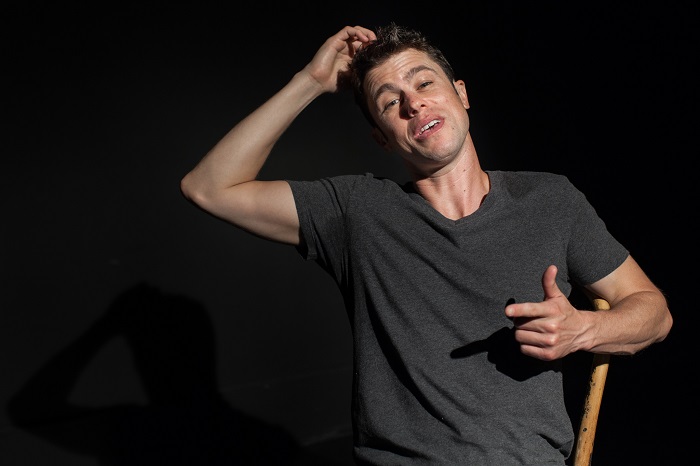
TOMMY: How much does verbatim text make its way into “The Block?”
DAN: I’m not a strictly verbatim writer. I don’t know what percentage I put. There’s definitely stuff that is verbatim, but it’s heavily blended. The note that I always put in my programs is, “The words that you’re going to hear tonight are often a mix of several people’s and my own in service of the larger emotional truth of my experiences.” Some people that I’ve interviewed recognize part of their story, and there’s sometimes characters that are very much like that person. There’s also composite characters. So it’s a blend.
TOMMY: Are all of the characters in the show people of color?
DAN: Right now yeah.
TOMMY: And may I ask, are you white?
DAN: I am.
TOMMY: So in going into this community, which you’ve lived in now for two years, did you find any pushback or difficulty getting people to open up or trust you?
DAN: You know, I’ve found, in 12 years of doing this professionally, that if you are curious and show a genuine interest in understanding what’s going on, people want to let you know what’s going on. The only time that I ever get pushback — when I was in Nigeria, and I’m trying to talk to a government official who knows that I know that they’ve stolen millions of dollars, they don’t really want to be interviewed. But in terms of everyday folks, which is most of what my work is, they want their stories to get out there. And I think that’s always a process of creating trust. That’s definitely one of the skills I think in this work you have to learn and continually work on. But no, I haven’t encountered any pushback on this project.
TOMMY: What about externally? Have you encountered any skepticism or pushback, from outside the project?
DAN: I’m going to deal with this sort of question in interviews my whole career as a white guy. But I think, first of all, anyone who’s seen my work generally knows that it comes from and is very much soaked in empathy for the characters. And I think the notion of people trying to understand people from different backgrounds is partly the point of theater. I think it’s important to try to understand experiences beyond ourselves. If only people of the same background write about people of the same background, then in a way we’re saying, “Well we can’t really understand one another. We’re too unknowable.” To me, that’s not really progressive… I think I’ve built up a trust with my audience and a brand that is saying, “Hey I have a methodology, and I’m trying to go out there and understand this, and I’m gonna present it to you in a way that is empathetic and also has a lot of rigor.”
TOMMY: That’s great. And you are often an actor in your shows. Are you planning to either put yourself — Dan, the interviewer — as a character in this? Or are you going to act in it?
DAN: We don’t know right now… In this case, I’m not really sure, because right now I haven’t written the interviewer guy. And I’ve thought about trying to write a white record collections character guy, who comes in, but really that’s not what I experience and what I see on the block. There’s not a lot of white people, and a lot of what I’m interested in is how people organize themselves, how people lift each other up and pull people down within this context. And just kind of show this world and not try to frame it in some way that doesn’t feel realistic to the experience.
TOMMY: So in terms of that, are there things that you expected to find that you didn’t find, or things that you weren’t expecting that really surprised you?
DAN: Yeah, I mean… I like hearing about how people got to the Bronx. You have a lot of black folks that came up from South Carolina and North Carolina, and that’s only a generation away… People who talk about growing up, like, the first part of their childhood living a rural life in small town Alabama, and milking cows, and trying to keep the chickens away from the wolves. And then they spent the rest of their lives in the South Bronx, which is one of the most urban places in America. So that’s been really interesting. And I’m always interested in how people move beyond their circumstances. And one of the interesting turns I often find is just people who are organized, organizing themselves, organizing their communities. There’s power just in that. And so I’ve been trying to find characters too who are really doing positive things for the South Bronx… All I do is try to understand what’s going on, hanging out with people, practice the journalism of hanging out, which is William Finnegan‘s phrase, which I love. Because my work isn’t just, “Here’s an interview.” Often times it’s showing people in a context that’s not an interview. And so I do that for months, and then I do a research collation, and then I start writing characters. In this case, I sort of did that for a bit, and then I wrote the first rounds of things last spring. And then I’ve been doing more research and writing the second half.
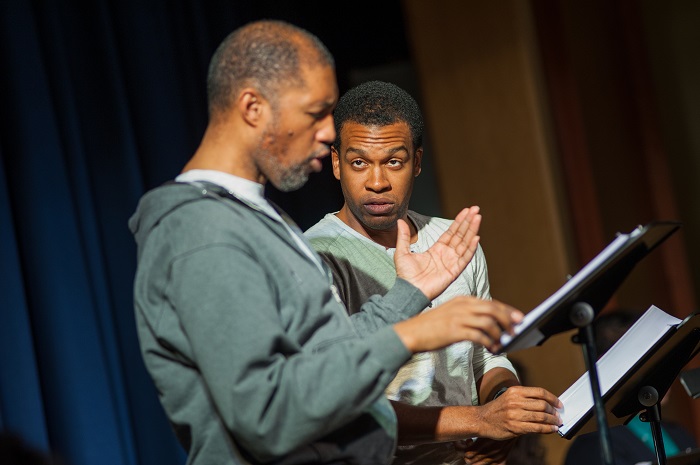
TOMMY: Have you workshopped it at all?
DAN: We had workshop performances last spring. Every Five Boroughs One City project did several readings. We did a couple readings in the Bronx, and then we had a feedback session, story circle afterwards. And then we did a couple nights in Manhattan, as well. And we’re going to be doing some workshopping with actors soon.
TOMMY: What information did you get in that workshopping process, especially in the Bronx?
DAN: It was kind of your early feedback sessions, where the piece is still early-on in development, and so it’s not great, and people are like, “Why don’t you try this, why don’t you try that?” But it was good, because people really responded to the authenticity of the characters. I didn’t really have a plot. I’m doing sort of an ethnographic piece, but it’s not just a series of character portraits. It’s trying to have a plot. How do I find that balance? And I initially had this device that was kind of, I was inspired by Richard Linklater’s “Slacker,” where there’s kind of a loose device that allows different characters to come on and give a monologue to another actor, another character, and then that person sort of goes on. And it’s sort of this cascading series of monologues that would then reverse and we’d have a second round of how that person turned out. But it, to me, it started to feel too devicey and not true. So for the second pass, I’ve limited the characters, and I’m trying to create more of a play. It’s sort of like, at times, I feel like the characters are Stephen Adly Guirgis-y with Annie Baker rhythms, and I’m not sure if that’s a total train wreck or not right now. But I’m trying to find that balance between story and ethnography.
TOMMY: Are you trying to impose a three-act structure on it?
DAN: Yeah, that has been the latest. You know, I saw the Steve Jobs movie, and I was interested in the way Sorkin basically wrote a three-act play. And so I started experimenting with that, that it’s three days over the course of a year. The most recent pass now, there’s four days. So it may turn into five. But yeah, the first day is Memorial Day Weekend, Fourth of July weekend, Labor Day weekend, and right before the Christmas holidays. And that allows for the passage of time, which is a staple, I think, of research-based non-fiction-type narrative. But it’s all been interesting, because it’s basically one set, so we’re just seeing the block take place for some time on each of these days.
TOMMY: Great, so I guess in wrapping up, I’d love to know how doing this project has impacted your relationship to where you live.
DAN: That’s a good question. You know, it’s interesting, because New York, in a way, can be a tough place to do research. And the South Bronx, in a way, can be tough, too. It’s definitely a different place than it was 20 years ago, but it can still be a place where people have their guard up a lot. And I think when you walk around, you know, it can be very loud, there’s a lot of people yelling at each other. It can feel like a kind of a rugged place. I think what’s been cool about being able to peel back that layer is being able to hang out with people and get to know their individual stories, and to see that, beyond this veneer, there’s all kind of interesting things happening.
TOMMY: What kind of a community do you come from yourself?
DAN: I come from a middle class artist community. When I was a kid, I lived in a city. I lived in San Francisco. I took buses, I played in public parks, you know, I played basketball and strike outs. My dad is an actor and performer. I was exposed to a lot of different things — everything from left-wing artist circles to being on the back of the buses and getting jumped as a kid. There’s a lot of different strands… That’s one of the fun things, too, is when people look at me, I sort of look like — and in many ways I am — a pretty generic looking white dude. But the work I’ve done, and the research I’ve done, shows that you have to go there to know there. And then I take a lot pride in when I create characters that they honor the people that I met, and that people start to say, “Wow, if this guy can go there and not just have this level of trust, but be able to create characters that are credible and nuanced and rigorous, then what else can we do to go beyond our safe comfort zones?” And I think it’s really easy for us to throw bombs of, policing who can do what kind of ventures, but I really feel that the proof is in the pudding. And if you do it with real skill and empathy and methodology, then we’re able to open up worlds and understanding that we wouldn’t if we all just stayed in our little corners.
Authors
-
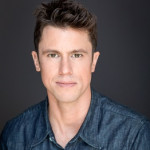
Dan Hoyle is an actor and playwright based in New York City. His brand of journalistic theater has been hailed as "riveting, funny and poignant" (New York Times) and "hilarious, moving and very necessary" (Salon). His solo shows “Each And Every Thing,” “The Real Americans” and “Tings Dey Happen” — all created and premiered at The Marsh Theater in his native San Francisco — have had critically acclaimed runs Off-Broadway (Culture Project, Joe’s Pub at The Public Theater) toured the country and overseas (Berkeley Rep, Cleveland Playhouse, Portland Center Stage, Painted Bride in Philadelphia, The Park in Calcutta, India and five cities in Nigeria on an official U.S. State Department tour), and received several awards (Will Glickman Best New Play Award, TBA Best New Play Award, Edgerton Winner, Prize of Hope, Lucille Lortel nominee, Bay Area Theater Critics Circle). Hoyle was a Fulbright Scholar in Nigeria in 2005-2006, and has been awarded grants from the Fulbright Foundation, the Pew Theater Initiative, the Fleishhacker Foundation, the Zellerbach Foundation, and the Circumnavigator’s Club. He has served as an artist-in-residence teacher and has taught workshops at colleges and theaters around the country. He holds a double degree in Performance Studies and History from Northwestern University and lives in the South Bronx with his wife Lyra, a visual artist and art teacher in Bronx and Manhattan schools.
View all posts -
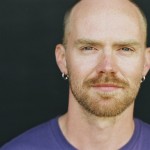
Tommy O'Malley is a Brooklyn-based writer and performer. He is a former Artistic Associate at the Civilians. He produces the storytelling show Big City Stories in Brooklyn and Manhattan. He regularly appears on the podcast "Race Wars," hosted by Kurt Metzger and Sherrod Small, and co-hosts its spin-off podcast "Unhireable" with comic Keren Margolis.
View all posts


